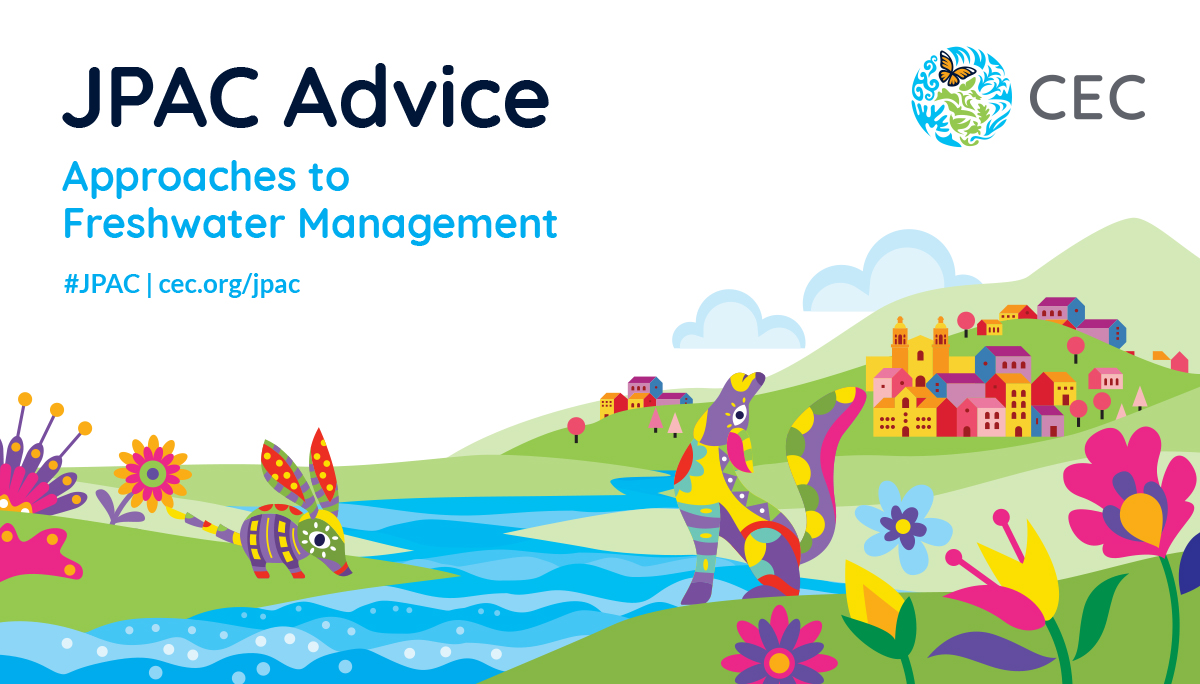New JPAC Advice on Community-based Conservation of Freshwater Resources

Joint Public Advisory Committee (JPAC) submits Advice to the CEC Council following Public Forum on community-based conservation of freshwater resources.
Tiohtià:ke (Montreal), 30 May 2024 — Following the November 2023 Public Forum held in Oaxaca, Mexico, the Joint Public Advisory Committee (JPAC) of the Commission for Environmental Cooperation (CEC) submitted an Advice to the CEC Council on community-based conservation of freshwater resources.
The environmental challenges stemming from climate change significantly impact society, particularly Indigenous and local communities and underserved populations. Effective management of freshwater resources is crucial to combat increased pollution, habitat degradation and extreme weather events. Across North America, this shared responsibility involves communities, governments and industries. Community-led conservation efforts to manage land and water and promote biodiversity have never been more essential.
Under the theme Community-based Conservation of Freshwater Resources: Forging Alliances for Water Stewardship, JPAC invited feedback from the general public, Indigenous communities, academia, NGOs and government to discuss water management strategies and to highlight community-led efforts to address the complexities of freshwater conservation and its sustainable use. The discussion included a strong focus on building and maintaining partnerships to achieve the goal of freshwater conservation.
JPAC Recommendations
- Continue to support relationship building among Indigenous Peoples, community-led and not-for-profit organizations, and other public and private key actors, as a key component for developing successful partnerships among them, and for advancing the weaving of Traditional Ecological Knowledge (TEK) and Indigenous perspectives into the work of the CEC:
- JPAC recommends that the Council continue to consider freshwater management and conservation as a priority in CEC’s work.
- As part of a continued engagement and collaboration with Indigenous Peoples, JPAC would like to work together with the Traditional Ecological Knowledge Expert Group (TEKEG) to organize a joint annual, trinational Indigenous-led session that would take place in conjunction with one of the JPAC’s existing Public Forums, rotating through the three countries and beginning in the fall of 2024.
- Due to the limited resources available, JPAC recommends that the Council allocate additional financial resources to the TEKEG budget to support the travel of Indigenous participants to this one-day event as well as the JPAC public forum.
- Support Indigenous and community-led conservation efforts through a knowledge, practices, and experience-sharing process:
- JPAC recommends that the Council focus the next cycle of the North American Partnership for Environmental Community Action (NAPECA) on supporting Indigenous and community-led conservation initiatives that promote experience-sharing processes, as well as capacity building.
- JPAC recommends that the CEC carry out an assessment of CEC projects related to Indigenous and community-led conservation efforts planned for 2024, as well as projects funded under NAPECA in 2025. This assessment would compile best practices and lessons learned.
- Explore additional ways to further expand participation from diverse populations, in particular, from youth and Indigenous Peoples, into the activities of the CEC:
- JPAC recommends that the Council support an activity as part of the Community-led Environmental Education Initiative for Biocultural Heritage Protection to explore ways to promote and leverage youth engagement and intergenerational exchanges into the CEC’s activities and initiatives.
- JPAC recommends that the Council support a youth engagement activity (or event) for 2024, in conjunction with the trinational workshop that will be organized as part of the project Communities for Environmental Justice Network (CEJN) aimed at creating a network of Indigenous, local vulnerable, disadvantaged and/or underserved communities that have environmental justice concerns.
- JPAC recommends that the CEC continue to review and assess the different mechanisms available to promote a greater diversity among participants in its public activities, including Indigenous communities, youth, women and 2SLGBTQIA+ individuals.
JPAC is confident that the recommendations are relevant to the CEC Council’s strategic priorities and its members are unanimous in supporting this Advice to Council.
Please click here to consult the full Advice.
For updates about CEC initiatives and news, sign up for our newsletter and follow us on social media.
